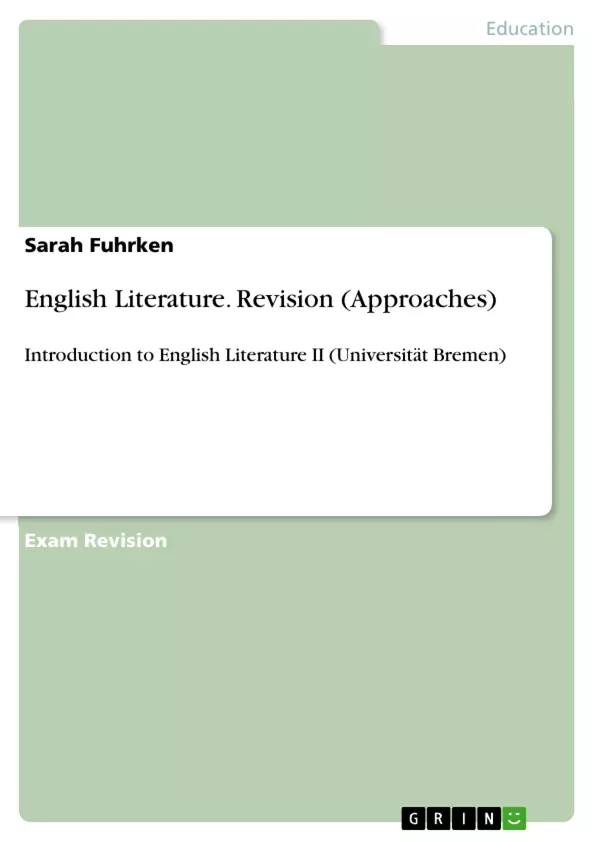With this revision sheet I could manage the exam easily. It includes everything you need to know if you take this course at Universität Bremen.
based on Pope, Rob (2012): Studying English Literature and Language. An Introduction and companion. 3rd edition. Routledge.
includes:
Approaches and Methodologies in Literary Studies
Practical Criticism and (Old) New Criticism
Formalism and Functionalism
Defamiliarisation
Foregrounding
Psychological Approaches
Reader-response Theories and Criticism
Marxism, Cultural Materialism, New Historicism
Feminism, Masculinity, Queer Theory
Poststructuralism and Postmodernism
Postcolonialism and Multiculturalism
Electicism: Ethics, Aesthetics, Ecology
Media Studies
Typical Authors for each approach
Inhaltsverzeichnis (Table of Contents)
- Approaches and Methodologies in Literary Studies
- Historical reality as context
- Sociological and Marxist approaches
- Feminist approaches
- New Historicism
- Cultural Materialism
- Author-oriented approaches
- Biographical approaches
- Psychoanalytical approaches
- Studies of a text's genesis and its place within an author's oeuvre
- Text-oriented approaches
- Text-intrinsic approaches
- Formalist/Structuralist approaches
- Poststructuralism/Deconstruction
- Reader-oriented approaches
- Reception Aesthetics
- History of Reception and Effects of Works
- Empirical Reception Studies
- Reader-Response Criticism
- Cognitive Narratology
- Other texts as context
- Sources and Influence Studies
- Studies in Intertextuality and Intermediality
- Gender Studies
- Postcolonial Criticism
- Empirical Literary Theory
- Words on the Page – Practical Criticism and (old) New Criticism
- Devices and Effects – Formalism into Functionalism
- Mind and Person – Psychological Approaches
- Reader-response theories and criticism / Hermeneutics
- Class and Community - Marxism, Cultural Materialism and New Histoicism
- Gender and Sexuality – Feminism, Masculinity and Queer Theory
- Relativities – Poststructuralism and Postmodernism
Zielsetzung und Themenschwerpunkte (Objectives and Key Themes)
This text provides an overview of various approaches and methodologies used in literary studies. It aims to equip readers with a comprehensive understanding of different theoretical perspectives and their applications to literary analysis. The text explores the relationship between literary works and their social, historical, and cultural contexts. It also delves into the role of authors, texts, and readers in shaping literary meaning and interpretation.
- The interplay between literary texts and their contexts
- The evolution of literary theory and its major figures
- The importance of close reading and textual analysis
- The influence of social, cultural, and historical factors on literary interpretation
- The role of reader response in shaping literary meaning
Zusammenfassung der Kapitel (Chapter Summaries)
- Approaches and Methodologies in Literary Studies: This chapter introduces various approaches to literary studies, encompassing historical, sociological, Marxist, feminist, and reader-oriented perspectives. It examines the interplay between literary texts and their contexts, including historical events, social structures, and cultural norms.
- Words on the Page – Practical Criticism and (old) New Criticism: This chapter delves into the methodologies of Practical Criticism and New Criticism, emphasizing close reading and textual analysis. It explores the key principles of these approaches, including the focus on the text itself and the rejection of authorial intention and reader response.
- Devices and Effects – Formalism into Functionalism: This chapter traces the development of Formalism into Functionalism, highlighting the shift from text-centered analysis to a more socially conscious approach. It examines the concepts of defamiliarization and foregrounding, and their role in shaping literary meaning and effect.
- Mind and Person – Psychological Approaches: This chapter explores the application of psychological theories to literary analysis. It examines how literary texts can reveal insights into the human psyche, including unconscious drives, motivations, and identities. It also discusses the role of language in shaping our understanding of self and others.
- Reader-response theories and criticism / Hermeneutics: This chapter focuses on reader-response theories and their impact on literary interpretation. It examines the active role of the reader in shaping meaning and understanding, and the interplay between text and reader in creating a shared experience.
- Class and Community - Marxism, Cultural Materialism and New Histoicism: This chapter explores the influence of Marxist, Cultural Materialist, and New Historicist approaches on literary analysis. It examines the relationship between literary texts and social structures, power relations, and ideologies, and the ways in which texts reflect and contribute to broader social and cultural contexts.
- Gender and Sexuality – Feminism, Masculinity and Queer Theory: This chapter focuses on the application of feminist, masculinity, and queer theories to literary analysis. It examines how gender and sexuality are represented in texts, and the ways in which these representations reflect and challenge prevailing social norms and power structures.
- Relativities – Poststructuralism and Postmodernism: This chapter explores the influence of Poststructuralism and Postmodernism on literary theory and criticism. It examines the concepts of deconstruction, fragmentation, and the rejection of grand narratives, and their impact on our understanding of literary meaning and interpretation.
Schlüsselwörter (Keywords)
This text explores key concepts in literary studies, including literary theory, textual analysis, close reading, social context, historical context, cultural context, reader response, gender studies, feminist theory, Marxist theory, psychoanalysis, poststructuralism, and postmodernism. It examines the relationship between literature and society, culture, and history, and the ways in which these factors influence literary interpretation.
Frequently Asked Questions
What are the main approaches in English Literary Studies?
The revision sheet covers historical, sociological, Marxist, feminist, psychological, reader-oriented, and poststructuralist approaches.
What is the focus of "New Criticism"?
New Criticism emphasizes "Practical Criticism," focusing strictly on the "words on the page" and rejecting authorial intention or historical context.
How do Marxist and Cultural Materialist approaches differ?
Both look at class and power, but Cultural Materialism specifically examines the relationship between literary texts and the social institutions that produce them.
What is "Reader-Response Theory"?
It is an approach that focuses on the active role of the reader in creating the meaning of a text, rather than seeing meaning as static within the words.
What concepts are central to Formalism?
Key concepts include "defamiliarization" (making the familiar strange) and "foregrounding" (highlighting specific linguistic features).
- Citation du texte
- Sarah Fuhrken (Auteur), 2014, English Literature. Revision (Approaches), Munich, GRIN Verlag, https://www.grin.com/document/279668



